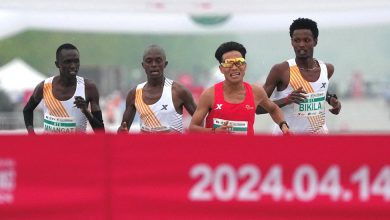For Papua New Guinea, a Long Journey to Cricket’s Big Stage

Thousands turned up at the airport to welcome Papua New Guinea’s cricket team on that sunny day in 2019. They wore the team’s colors and carried its flag and cheered their returning heroes, the players and coaches who had just qualified the nation for cricket’s Twenty20 world championship for the first time.
More than a few people, in the crowd and in the team, were in tears.
“To make the World Cup is a tremendous feeling,” said Greg Campbell, the chief executive at Cricket PNG, the body responsible for the game in Papua New Guinea. “Watching some of these boys cry when we returned back home from Dubai to 4,000 people at the airport was an emotional moment.”
The World Cup in Australia was still a year away that afternoon. There was, back then, plenty of time to process the achievement and celebrate it with family and friends and then get back to the hard work of preparing to face the world’s best teams.
What no one knew was that a pandemic was about to bring the world to a halt, force the relocation of the tournament to first India and then to the Middle East, and keep Papua New Guinea’s players and their coaches off cricket fields — at least in a competitive sense — for nearly two years.
“Because our government limited social gatherings to 10, we were forced to train in smaller groups of four or five in our villages, or sometimes in the countryside,” said Jon Ovia, who has been Papua New Guinea’s assistant coach since 2015. “Grounds and facilities were off limits too, and our only means of communication was through our phones, which can be difficult due to poor internet connectivity. I didn’t see some of the boys for eight months.”
Papua New Guinea’s big moment was never going to be easy. But after earlier near-misses — it lost in a playoff for a World Cup berth in 2013 and then dropped a win-and-qualify match in 2015 — its team has, at last, arrived. On Sunday, forty-eight years after the country was formally admitted as an associate member of the International Cricket Council — the sport’s global governing body — 11 of Papua New Guinea’s finest cricketers will step inside Al Amerat Stadium in Oman’s capital, Muscat, in the latest highlight of their underdog journey.
“Having the honor of leading this group in World Cup is a great achievement,” said Assad Vala, Papua New Guinea’s captain and top batsman. “We’ve been so close on so many occasions, but now the excitement is filling up. We can’t wait to get out there, sing the national anthem, and play.”
The format of Twenty20, the faster, TV-friendly version of cricket, is among the team’s rare advantages this month. The matches — most conclude in a matter of hours, rather than days — are seen as a chance for smaller cricket-playing nations like Papua New Guinea, Oman and Namibia to have a fairer chance to compete against more established rivals like India and England.
For Papua New Guinea, even advancing out of the preliminary rounds to the main field will be viewed as an achievement, especially after a lead-up to the tournament that was littered with obstacles.
In a bid to acclimatize to playing conditions at the World Cup and dust off some of the rust from the team’s extended pandemic layoff, Campbell recently organized a monthlong trip to Muscat for matches against Oman, Scotland, the United States and Nepal. The effort to forge a much-needed competitive edge was soon complicated, though, by off-the-field news: In the middle of the camp, three members of the Barramundis, as the team is known, learned that family members back home had died. Days later, an approaching tropical storm forced them to briefly abandon their belongings in their hotel at a coastal resort.
“We had two mottos when we left PNG,” said Campbell, a former Australian cricketer. “One is Back the Barras. The other was No Excuses. Everyone is in the same boat with Covid-19. We have to face what is thrown at us.”
When the tournament begins, Papua New Guinea will be severely tested. The top two teams from a group consisting of the Barramundis, Oman, Scotland and Bangladesh will join two from a second preliminary group — Ireland, Namibia, Sri Lanka and the Netherlands — in the main round of the competition. It is there where eight of cricket’s more traditional powerhouses await, and where Papua New Guinea’s players want to go.
“I don’t like using the word expectations, because if you have too many, there is pressure to live up to them,” said Charles Amini, Papua New Guinea’s key all-rounder whose brothers, father, mother and grandfather have all played for the country’s national teams. “No one will see us as realistic qualifiers for the main round, which is a good thing, so hopefully we can turn some heads.”
Papua New Guinea lost all 12 matches in the lead up to the curtain raiser against Oman on Sunday, so it would be easy to argue that its cricketers are suffering from a case of misplaced confidence. But alarm bells aren’t ringing for the players or for Campbell. He credits the relaxed frame of mind within the squad to the “island mentality” that permeates Papua New Guinea’s nine million inhabitants.
Added Vala: “We aren’t here to make up the numbers, and believe we can beat any team if we play our best cricket. We have to be on the money, from first ball to last ball, execute our plans to the best of our abilities to have a chance. We’ll give everything we got.”




